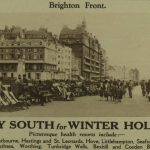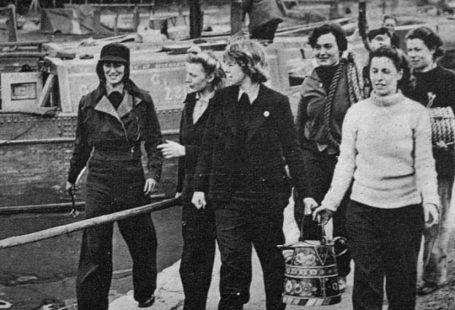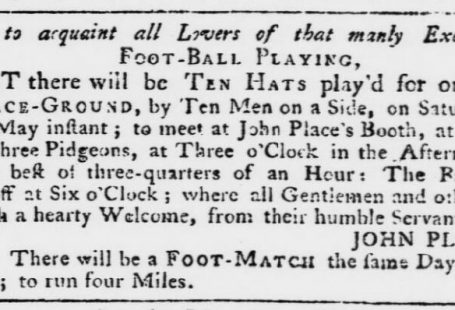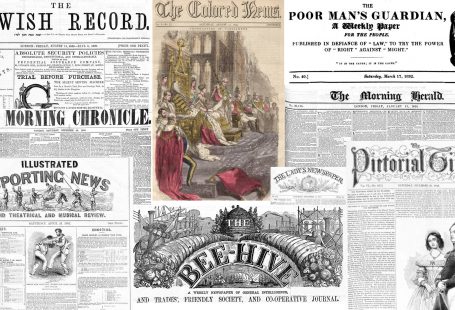By 1939 there were an estimated three to four hundred holiday camps established across the United Kingdom, with the smallest housing fifty beds, and the largest with six thousand or more. What was behind the surge in popularity? We explore the holiday camp phenomenon by delving into the pages of the British Newspaper Archive, using the myriad of advertisements, photographs and articles located there to discover more about this mainstay of the British seaside resort.
In 1936 William ‘Billy’ Butlin founded his first holiday camp in Skegness. Based on his own experiences of mundane and cramped boarding houses, he wanted to create a kind of fantasy world and escape for the working man, building a luxurious and affordable seaside resort in miniature.
This is exactly what he did. An advertisement placed in a May 1936 edition of the Nottingham Journal boasts of the facilities on offer at the ‘wonderful £50,000 Holiday Camp:’
FREE: Golf, Tennis, Bowls, Bathing, Dancing, and Concert Parties. Boating, and licensed club. FOUR good meals per day cooked by experienced Chefs. Cosy Elizabethan Chalets with electric lights, carpeted floors, running water, Bath and first class sanitary arrangements.
 Nottingham Journal | 23 May 1936
Nottingham Journal | 23 May 1936
The benefit and the lure of Butlin’s lay in its inclusivity – there were no extra costs – and its affordability, with prices in 1936 being as low as 45 shillings a week. An advertisement in the Birmingham Daily Gazette, 17 August 1937, lauds Billy Butlin and his ‘biggest idea of holiday happiness ever known. With the true art of showmanship, he made the camp attractive, entertaining – in fact, you cannot spend a single dull moment there.’
Liverpool Daily Post | 22 March 1939
By 1937 The Sphere had published an article entitled ‘The New Holiday – The Advent of the Giant Summer Camp.’ It describes the benefits of the Summer Camp – one being that ‘they are weather proof. In boarding houses the day is spoilt when guests are driven indoors by the bad weather into over-crowded rooms.’ Not so at a place like Butlin’s, where gymnasiums, reading rooms, theatres and bands were all on hand to entertain guests in the case of rain.
Billy Butlin had no doubt tapped into a popular need. The first advertisement for his Skegness camp had an overwhelming 10,000 replies and it was fully booked upon its opening at Easter 1936. But who was Billy Butlin, the man who would go on to be a millionaire by the end of the 1940s, and earned a knighthood in 1964?
He was born in South Africa in 1899, but moved with his mother to Canada upon the death of his father. On the outbreak of war he enlisted giving a false age, and served as a bugler until his ‘patriotic fib was discovered and he had to go back to work. Undeterred, he joined the army again and went to France.’
After the First World War he travelled to England to work as a showman, and didn’t give up his enterprise even when his uninsured lorry, full of his stalls, was destroyed by fire. He then moved on to his holiday camp idea, and captured the public’s imagination in the process.
Holiday camps were not invented by Billy Butlin, however. The first was Cunningham Young Men’s Camp on the Isle of Man, which was opened in 1894 and was very basic, having an emphasis on camping and outdoor living. An advertisement for the camp over forty years later in the Liverpool Evening Express, 19 June 1939, reveals a slightly more salubrious affair, with ‘Spring Beds’ and ‘Splendid unlimited catering’ available.
Liverpool Evening Express | 19 July 1939
Another early forerunner was the socialist holiday camp at Caister-on-Sea, near Great Yarmouth. Suffragette publication Votes for Women advertises it as ‘an ideal holiday resort for Suffragettes,’ with ‘surplus profit’ going towards ‘the cause.’
Billy Butlin transformed the holiday camp world by placing an emphasis on affordable luxury. He built camps at Skegness and Clacton, and finished construction on one at Filey by 1939. However, just as construction on Filey was finished, war broke out, and the camp was requisitioned by the RAF, who used it first as a Recruit Centre, and then as an Ack-Ack Training School.
In 1946 the camp was released back to Butlin’s, but some things didn’t change. The Station Commander of the Filey camp during the war, Group-Captain Borthwick-Clarke, stayed on as camp controller. He went on to give this wonderful description of his role as camp controller in an 1946 interview in The Sphere:
It is exactly the same as it was when I was commanding here during the war. On rare occasions one has a group of youths, usually under the age of twenty, who start making a noise in their chalets after 11pm, and have to be quietened. I send for them next morning and inform them that if they do not guarantee to behave themselves they will be compelled to leave…They always behave after that. I have not had a single case of drunk and disorderly.’ Group-Captain Borthwick-Clarke went on to say that excessive hilarity was a very rare occurrence.
As if Group-Captain Borthwick-Clarke’s reassurances were not enough, The Sphere assures readers who may have doubts about the morality of such camps ‘that the Archbishop of York has accepted the honorary appointment of Ecclesiastical Adviser to Butlin’s Luxury Holiday Camps.’
This mix of quasi-regimentation (campers being woken at 8.00am by music), and kiss-me-quick irreverence (a 1937 brochure describes how on the tennis courts ‘you can borrow anything from a ball to a blonde partner for the asking…both have got to be returned of course, but the courts are really good’) that made Butlin’s such a phenomenon.
Its success, of course, continued well after the Second World War, with a 1966 advertisement in The People declaring; ‘No, it’s not the Riviera, it’s Butlin’s,’ and families continue to enjoy holidays there to this day.
You can find out more about the history of Butlin’s and other holiday camps by searching in the British Newspaper Archive, and you can find photographs by limiting your search to ‘illustrations.’













